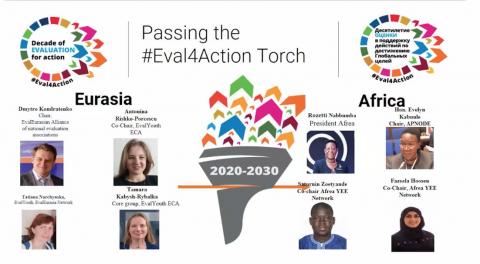
The Eval4Action Regional Consultation in Africa took place online on 19 December to discuss the different roles of M&E in Africa that are useful to reach the Sustainable Development Goals (SDGs) as well as the development of partnerships to promote influential evaluations for the SDGs. It was also an opportunity for the Africa region to show its engagement and commitment to the Eval4Action campaign. The purpose of the campaign is to mobilize commitments by different stakeholders, including parliaments, governments, and evaluation associations, to invest in stronger evaluation systems to inform public policies and ensuring no one is left behind.
The event, which gathered many participants from the African Monitoring and Evaluation (M&E) sphere, was organized by the African Evaluation Association (AfrEA) and AfrEA Young and Emerging Evaluator (YEE) Network, in partnership with the UNFPA Evaluation Office, EvalYouth Global Network, African Parliamentarians’ Network on Development Evaluation (APNODE) and Réseau Francophone de l'Evaluation (RFE). Launched and moderated by Tessie Catsambas, founder and CEO of EnCompass LLC, the regional consultation saw the participation of Hon. Evelyn Mpagi-Kaabule, Chairperson of APNODE, Samuel Kouakou, Vice-President of AfrEA and member of APNODE Executive Committee, Rosetti Nabbumba (AfrEA President), Fazeela Hoosen and Saturnin Zoetyande (AfrEA YEE network co-chairs), Marco Segone (Director UNFPA Evaluation Office), Khalil Bitar (Chair of EvalYouth Global Network). These speakers presented their respective organizations' contributions and actions and will continue to make to the evaluation agenda in Africa’s sustainable development.
Hon. Evelyn Mpagi-Kaabule was one of the guest speakers. She talked about the role parliamentarians can play in building an enabling evaluation environment in Africa and touched briefly on the work of APNODE in enhancing and advancing the demand for, and utilization of, evaluation in national decision making to support development effectiveness and inclusive growth. She added “to enable a positive evaluation environment on the continent, parliamentarians should be well informed with up-to-date information about effective initiatives and development programs through evaluation so that resources are wisely invested in the country.”
The consultation also had small group discussions to gather participants’ thoughts or ideas on how evaluation can catalyze actions towards the SDGs. The question-discussion followed on what could be tangible actions to ensure that evaluation strategically contributes to accelerating progress towards the SDGs? The contributions from participants can be summarized as following:
- Identifying all stakeholders to bring them onboard
- Openness in engaging, collaborating, and avoiding unhealthy competition
- Establishing parliament policy on evaluation
- Using quality data to make evidence guided decisions
- Professionalization of evaluation
- Entrenching the culture of evaluation
- Promoting mentorship to ensure continuity
- Embracing our indigenous approaches and cultural context
- Improving capacity building using proper tools
- Working with the people around parliamentarians especially when data is held for political reasons
- Using evidence to re-channel resources to help with Covid-19 recovery based on evidence
The event was concluded by Marco Segone, Khalil Bitar, Mark Mulobi (a member of YEE Network), and Samuel Kouakou, who said in his final remarks that it is important to involve local evaluators for the achievement of the SDGs and work to provide a future generation of evaluators who will work to improve public policies evaluations for better development growth.
Watch the African regional consultation on Eval4Action YouTube Channel

